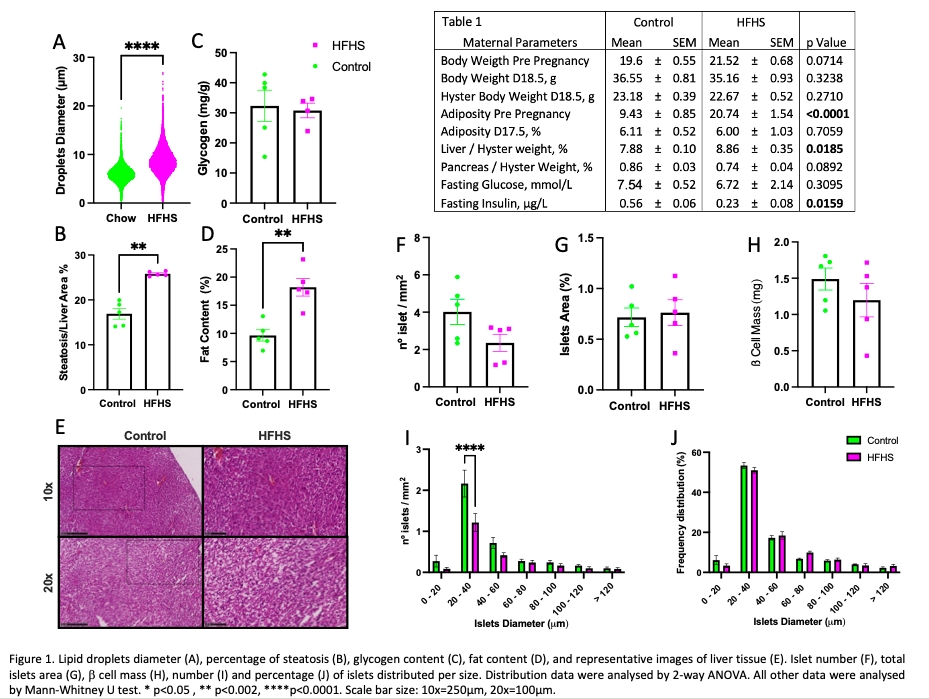Introduction: Western diets, high in fat and sugar (HFHS), are contributing to the increased number of women entering into pregnancy overweight/obese. In turn obesogenic diets/obesity are risk factors for metabolic conditions in the mother during pregnancy1. The liver and pancreas are key to metabolic regulation. Previous studies principally focused on the effect of long-term exposure to an obesogenic diet or established obesity on these organs in males or non-pregnant females2,3. This study aimed to determine if short-term exposure to a HFHS diet induces structural changes in the liver and pancreas that correspond to increased maternal body weight or adiposity during pregnancy. Methods: Animal experimentation was carried out under the UK Home Office Animals (Scientific Procedures) Act 1986, following ethical review by the University of Cambridge. 6 week old female mice were fed a control (RM3, SDS) or customized HFHS diet (35.9% fat, 29.5% sugar) (n=10/group) from three weeks prior to, and during, pregnancy (mated with control diet-fed males). Maternal body composition was assessed by TdNMR. On pregnancy day (D)17.5, tail nick blood samples were collected from 4-hour fasted dams for glucose and insulin measurements. On D18.5, dams were schedule 1 killed and liver and pancreas were weighed and processed for analysis. Livers were snap frozen for determination of lipid and glycogen content and pancreas and liver were PFA-fixed for histology. Data were analysed by 2-Way ANOVA or Mann-Whitney U tests where appropriate (significance considered at p<0.05). Results: Pre-pregnancy, despite only moderate changes in bodyweight (p=0.0714), HFHS dams had higher adiposity than controls (p<0.0001). However, by the end of gestation, there were no differences in body weight or adiposity between groups (Table 1). Liver weight, fat content, lipid droplet size and steatosis area were increased in HFHS dams compared to controls, although hepatic glycogen content was unaltered (Table 1 & Figure 1A-E). Fasting insulin, but not glucose concentrations were decreased in HFHS dams (Table 1). Moderately reduced pancreas weight in HFHS dams was seen, although average number of islets, islet area and β-cell mass were not affected. Frequency distribution analysis revealed a decrease in the number of islets with a diameter of 20-40 µm in HFHS compared to control dams (Figure 1F-J). Conclusion: A short-term HFHS diet is associated with maternal insulin deficiency during pregnancy, which is related to mild impairments in pancreatic islet morphology and likely defects in β-cell insulin secretion. It is also associated with excessive lipid accumulation in the maternal liver, which may compromise its functional capacity. Importantly, these HFHS diet-induced alterations occurred even without increasing maternal adiposity during pregnancy. These data suggest that short-term HFHS diets, as well as pre-pregnancy adiposity may cause metabolic derangements/disease in the mother during pregnancy even in the absence of changes in pre-pregnancy bodyweight or excessive gestational weight gain – which are current clinical risk parameters.
Physiology 2021 (2021) Proc Physiol Soc 48, PC078
Poster Communications: Maternal high-fat high-sugar diet induces metabolic alterations related to hepatic and pancreatic changes that are independent of changes in body composition
Alejandro A. Candia1, 2, Samantha C. Lean1, Edina Gulacsi1, Amanda Sferruzzi-Perri1
1 Centre for Trophoblast Research, Department of Physiology, Development and Neuroscience, University of Cambridge., Cambridge, United Kingdom 2 Department for the Woman and Newborn Health Promotion, Universidad de Chile, Santiago, Chile
View other abstracts by:
Where applicable, experiments conform with Society ethical requirements.

